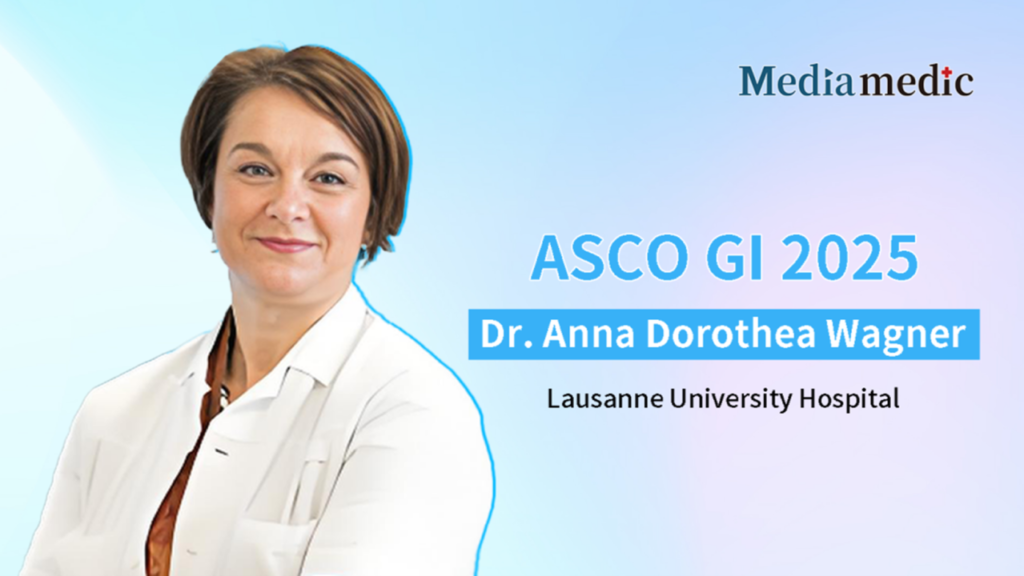
Editorial Note: The 2025 American Society of Clinical Oncology Gastrointestinal Cancers Symposium (ASCO GI 2025) successfully concluded on January 25. One of the most closely watched presentations at the conference was the release of results from the EORTC-1203—INNOVATION trial (Abstract LBA331), capturing the attention of oncologists worldwide. Oncology Frontier had the exclusive opportunity to interview Dr. Anna Dorothea Wagner, a medical oncologist from Lausanne University Hospital in Switzerland, to discuss the study’s findings. Below is a summary of our conversation.Study title:EORTC-1203 GITC “INNOVATION”: Integration of trastuzumab (T), with or without pertuzumab (P), into perioperative chemotherapy of HER-2 positive stomach cancer: Overall survival results
Oncology Frontier: Could you briefly introduce the main background of your study?
Dr. Anna Dorothea Wagner: I’m Anna Dorothea Wagner, a medical oncologist from Lausanne University Hospital in Switzerland. It’s an honor to speak with Oncology Frontier and discuss the results of the EORTC-1203—INNOVATION trial.
Since the publication of the ToGA trial in 2010, we have known that adding trastuzumab to palliative chemotherapy significantly improves survival in patients with HER2-positive gastric cancer. This discovery provided us with a therapeutic target and a treatment option that is both cost-effective and well-tolerated. However, for patients with metastatic HER2-positive gastric cancer, we are still unable to achieve a cure.
In Western countries, the prognosis for patients with resectable gastric cancer remains relatively poor, making perioperative chemotherapy essential to improving survival outcomes. The current standard perioperative chemotherapy regimen is FLOT, which has demonstrated a three-year overall survival rate of 56% and a five-year overall survival rate of 50%. Our goal was to build upon this foundation and further improve survival outcomes.
Given that 20% of gastric cancer patients are HER2-positive, we conducted this trial in patients with stage Ib-III HER2-positive gastric cancer. Participants were randomly assigned to one of three study arms:
- Chemotherapy alone
- Chemotherapy plus trastuzumab
- Chemotherapy plus trastuzumab and pertuzumab
At the trial’s inception, the chemotherapy backbone consisted of cisplatin and fluoropyrimidine-based regimens. However, after the publication of the FLOT4 trial, we adopted FLOT as the new standard chemotherapy regimen.
The primary endpoint of our study was the major pathological response rate (mpRR). Our findings revealed a clear advantage for trastuzumab in achieving major pathological responses. Among patients receiving FLOT alone, the major pathological response rate was 33%. In contrast, patients treated with FLOT plus trastuzumab achieved a significantly higher major pathological response rate of 53%. However, patients receiving dual HER2-targeted therapy with trastuzumab and pertuzumab did not show an advantage in major pathological response. The high toxicity associated with this combination, particularly severe diarrhea, prevented patients from completing the full FLOT regimen as planned, leading to suboptimal outcomes. Therefore, dual-antibody therapy does not appear to be a viable option.
Impact on Survival and Future Considerations
Other trials have demonstrated that patients treated with FLOT plus trastuzumab achieve high pathological response rates. Furthermore, patients who achieve a major pathological response have significantly improved recurrence-free survival and overall survival compared to those who do not. In our study, this difference was statistically significant, with a hazard ratio of 0.25.
Unfortunately, our trial did not show a significant improvement in progression-free survival (PFS) or overall survival (OS). Several factors may explain this. Firstly, the study was not statistically powered to assess overall survival. Secondly, due to a lack of additional funding, the trial was terminated early, leading to immature results with insufficient statistical power.
However, in my opinion, the significantly higher major pathological response rate observed in patients receiving trastuzumab in combination with FLOT is a compelling reason to consider this regimen. This treatment approach should be discussed with patients, weighing the potential benefits against the risks—particularly in cases where achieving a high response rate is crucial for curative resection.
Oncology Frontier: How does the therapeutic value of trastuzumab and pertuzumab in the perioperative treatment of gastric cancer compare to other drugs?
Dr. Anna Dorothea Wagner: Based on our trial data, we do not recommend the dual-antibody combination of trastuzumab and pertuzumab. The high incidence of diarrhea prevented patients from receiving the full-dose chemotherapy, which is an essential component of this treatment regimen.
Oncology Frontier: What impact do you think this treatment approach will have on the management of HER2-positive gastric cancer patients?
Dr. Anna Dorothea Wagner: As I mentioned, this trial had insufficient statistical power, and the survival outcomes remain immature. Therefore, we cannot draw any definitive conclusions from this study. However, I believe further research is warranted to explore the role of these targeted therapies in the perioperative treatment of gastric cancer. Considering trastuzumab in combination with chemotherapy for select patients should be an option, with a careful assessment of its potential benefits and risks.


